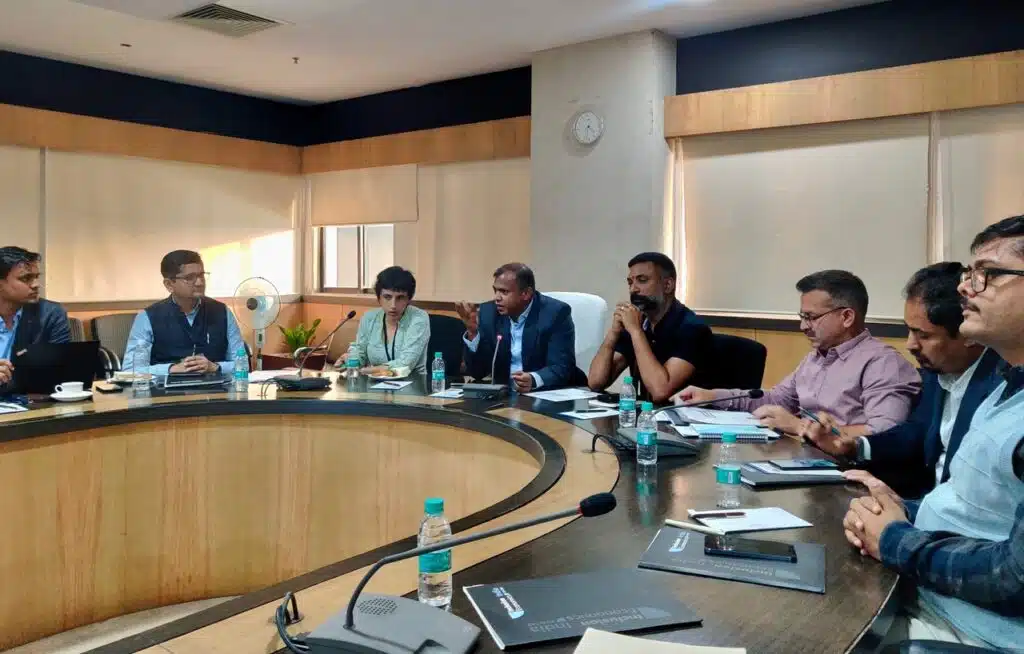Researchers discuss findings on increasing women’s engagement with mobile technology in Chhattisgarh
In a policy roundtable discussion on December 13, 2022, Inclusion Economics researchers shared insights on the impact of mobile phone access on women's employment and well-being with an audience of policymakers, government officials, and civil society representatives in the central Indian state of Chhattisgarh.
Women's Empowerment & Wellbeing: A policy-engaged research perspective

Policymakers, researchers and civil society members meet in Raipur to discuss how to improve women’s wellbeing and empowerment through policy-engaged research and programming
On December 13, 2022, Inclusion Economics India Centre (IEIC) at IFMR, in collaboration with the Government of Chhattisgarh, hosted a roundtable discussion titled "Women's Empowerment and Wellbeing: A Policy-engaged Research Perspective'' at the State Secretariat, Mantralaya, in Raipur. The event aligned with IEIC's mission to facilitate evidence-based dialogues with policymakers, drawing on recent studies. Attended by senior government officials, researchers, and professionals from civil society organizations working on women's empowerment in Chhattisgarh, the roundtable fostered a dynamic exchange of ideas.
Since 2017, IEIC has conducted research across multiple districts in Chhattisgarh, focusing on the factors influencing women's engagement with mobile phones. Ongoing conversations with Chhattisgarh policymakers and regional stakeholders have proven vital in generating actionable insights to inform policy decisions.
Rohini Pande, Professor of Economics and Director of the Yale Economic Growth Center, and Harsh Jaiswal, Research Manager at IEIC, presented research findings related to mobile phone usage, women's empowerment, and well-being in Chhattisgarh.
Understanding women's access and usage of mobile phones in Chhattisgarh
According to a 2018 GSMA report, mobile internet usage among men in Chhattisgarh was slightly above 25%, while women's usage was just under 10%, revealing a clear gender gap. IEIC researchers sought to determine whether digital literacy training could increase women's internet access and promote more flexible norms around mobile phone usage.
IEIC organized digital training camps for women aged 18-45 across 180 villages in Chhattisgarh and conducted a randomized controlled trial to examine the causal effects of such training. Six months post-training, women who received the training exhibited more liberal attitudes towards female phone usage, and an increase in phone usage was observed. The training contributed to narrowing the gender gap in phone ownership, enhancing social connectedness, and improving mental health.
Mor Awaaz Program
Following the training camps, the Chhattisgarh government enrolled over 10,000 rural women from Raipur district in the Mor Awaaz program. Participants received weekly recorded calls containing information on health, nutrition practices, and government welfare schemes. IEIC's research discovered an 11-percentage-point increase in women's knowledge about JSY amount (from a 29% base) and an 8-percentage-point increase in the scheme's utilization, although the latter was not statistically significant.
Collaborating with policymakers for women's empowerment
A slide displayed at the Chhattisgarh roundtable summarizing insights from the digital literacy training program.
The roundtable discussion marked a significant milestone in engaging with the Chhattisgarh state government. As IEIC's work in the state spans several departments, the event provided a platform for communicating with various ministries. Chaired by Shri. R Prasana, Secretary of the Department of Panchayat and Rural Development, the roundtable highlighted the value of research collaborations and IEIC's dedication to working with the government.
Policymakers expressed interest in applying the digital literacy training insights to other government initiatives across the state. The Ministry plans to train beneficiaries on using mobile phones to access other government schemes, drawing on IEIC's experience with digital literacy training. Furthermore, officials showed keen interest in learning about the methods used to facilitate women's participation in the training and program.
EGC Director Rohini Pande (far left) shares research insights from a collaboration with IEIC at the Chhattisgarh roundtable.
To expand the reach of the Mor Awaaz program, officials requested translations of the weekly recorded calls into languages other than Chhattisgarhi. This will allow more women to benefit from the vital information and contribute to their overall empowerment.
